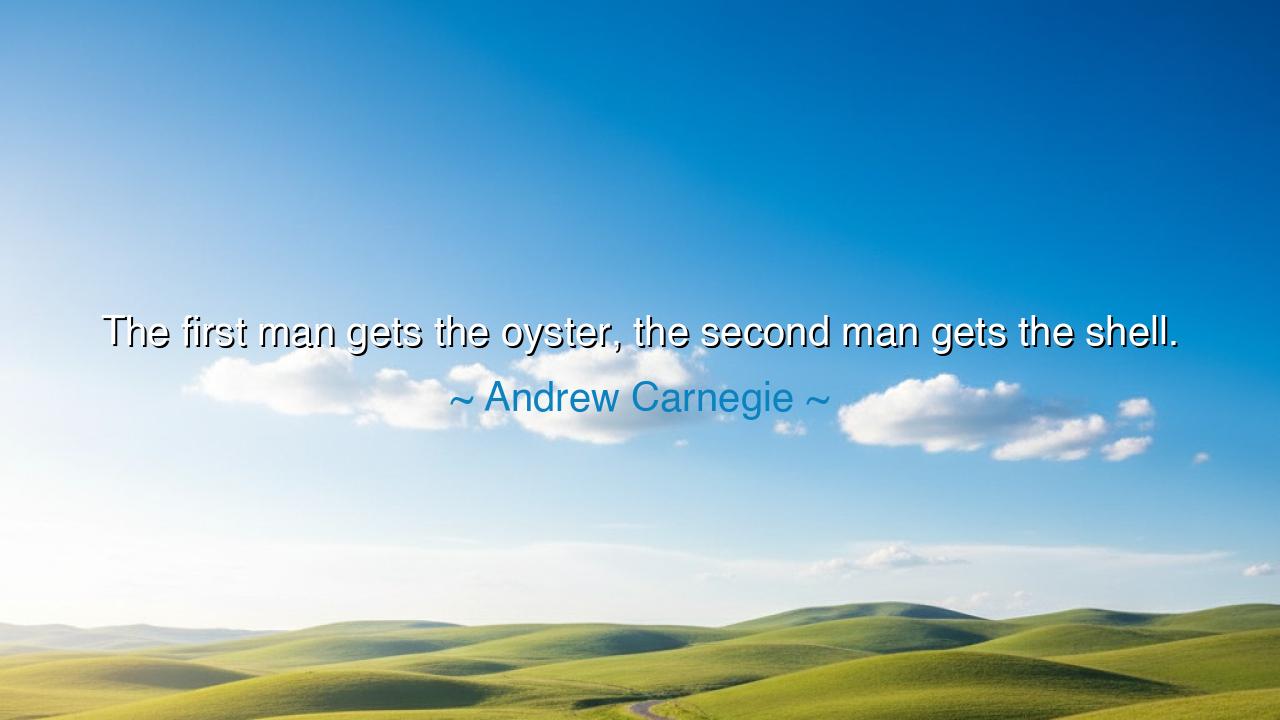
The first man gets the oyster, the second man gets the shell.






“The first man gets the oyster, the second man gets the shell.” So declared Andrew Carnegie, the great captain of industry, who rose from the smoke of iron furnaces to become one of the wealthiest and most visionary men of his age. His words, though simple, hold within them the fire of competition, the wisdom of initiative, and the eternal truth that opportunity favors the bold. The oyster—precious, nourishing, and rare—belongs to the one who dares first, acts first, and claims his destiny before others hesitate. The shell, empty and useless, is left to the one who lingers, who waits for certainty, or who lacks the courage to seize the moment when it appears.
To get the oyster is to claim the prize of life—to be the one who moves while others dream. It is not merely luck that grants the first man his reward; it is his readiness, his vision, and his will. Life does not scatter its treasures equally among all who desire them—it hides them in moments of decision. Those who act boldly and swiftly, who trust their strength and judgment, become the ones who feast, while those who delay must be content with what remains. Thus Carnegie, a man who began his life as a poor factory boy, understood that the world belongs not to those who wish, but to those who do.
The origin of this saying lies in the age of industrial conquest, when the furnaces of Pittsburgh burned like the forges of Olympus, and men of iron shaped the destiny of nations. In that crucible of ambition, Andrew Carnegie built his empire. But he did not wait for permission or perfection—he moved with the hunger of one who saw the oyster when others saw only mud. He invested in steel when others doubted its future. He took risks when caution whispered retreat. And because he dared to reach first, he secured the treasure before others had the courage to open their hands. The empire he built, and the fortune he later gave away, were the pearls born of that first grasp.
Yet the lesson of the oyster and the shell is not merely about business or wealth—it is about the law of life itself. In every field of endeavor, from art to leadership, from invention to love, the one who acts with conviction reaps the reward. The painter who begins his work, though uncertain, finds beauty; the one who waits for inspiration finds only an empty canvas. The explorer who sails into the unknown discovers new worlds; the one who watches from the shore finds only waves. Fortune does not smile upon hesitation—she favors the spirited, the brave, the quick of heart.
Consider the story of Alexander the Great, who as a youth looked upon the vastness of the Persian Empire and said, “I will conquer it.” He did not wait to grow older or stronger or wiser. He acted when the moment called, striking before others could. The first man—the one who dares—gets the oyster of glory, of triumph, of immortality in history’s memory. The second man, who follows too late, may find only the shell—the remains of opportunity once alive but now hollow. So it is with all human ambition: the reward belongs to the one who reaches first, with courage unshaken and purpose unclouded.
But beware, for this wisdom carries both power and warning. To move first is not to move blindly. The first man must also be prepared, discerning, and disciplined. His success is not born of recklessness, but of readiness. The world is full of those who rush forward only to grasp emptiness; yet the truly wise act not from impulse but from vision. Carnegie’s own life was proof of this balance—he moved quickly, but he planned deeply. He was bold, but never careless. To act first is only virtue when wisdom guides the hand that acts.
Therefore, learn this, O seeker of greatness: when the moment of decision arrives, do not hesitate. The door of opportunity opens but for an instant, and those who falter will find it closed. Train your mind to see the oyster before others see the shell. Sharpen your spirit until you can act with faith in yourself and the future. For history remembers not the cautious observer, but the first man who dared to claim his destiny.
The lesson is clear: in every struggle, there is an oyster to be claimed and a shell to be endured. Life does not wait for the slow or the uncertain. So act with courage, move with conviction, and let your preparation meet your moment. Be the one who reaches first—not in greed, but in purpose; not in haste, but in strength. For as Andrew Carnegie taught, “The first man gets the oyster, the second man gets the shell.” And in that single truth lies the eternal call to the bold.






AAdministratorAdministrator
Welcome, honored guests. Please leave a comment, we will respond soon